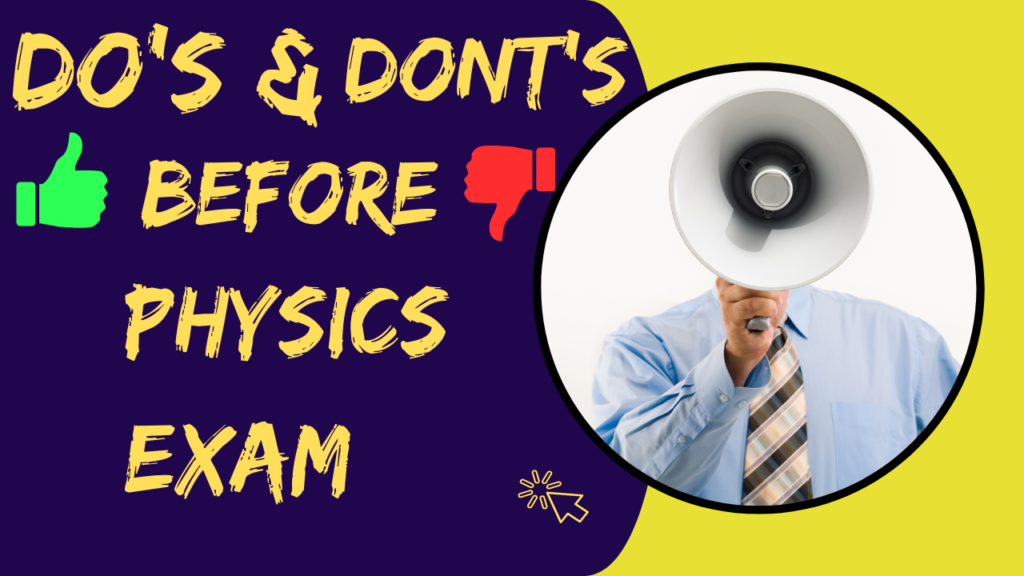
Physics exams are important for several reasons, both in an academic context and in terms of their broader impact on your education and future prospects:
- Assessment of Knowledge and Understanding: Physics exams are designed to assess your knowledge and understanding of fundamental physical principles, concepts, and theories. They test your ability to apply these concepts to solve problems and analyze real-world situations.
- Academic Progress: Physics exams play a significant role in determining your academic progress. They are a means of evaluating how well you have grasped the material taught during the course. Your performance in these exams contributes to your overall grade, which can affect your GPA and academic standing.
- Preparation for Higher-Level Courses: Success in physics exams is often a prerequisite for advancing to more advanced physics courses. A strong foundation in physics is essential if you plan to pursue a degree or career in science, engineering, or related fields.
- Problem-Solving Skills: Physics exams assess your ability to think critically and solve complex problems. These skills are valuable not only in physics but also in various other disciplines and professions. Problem-solving skills are highly sought after by employers.
- Application in Real Life: Physics concepts are used in various aspects of everyday life, from technology and engineering to medicine and environmental science. Doing well in physics exams helps you better understand and apply these principles in real-world situations.
- Career Opportunities: For many professions and career paths, physics exams are prerequisites. For example, if you aspire to become an engineer, physicist, astronomer, or any science-related career, a strong performance in physics exams is crucial.
- Standardized Testing: In some cases, physics exams are part of standardized tests such as the SAT Subject Test in Physics, AP Physics exams, or the Physics GRE (Graduate Record Examination), which can be required for college admissions or graduate school applications.
- Demonstration of Skills: A good performance in physics exams demonstrates your ability to work under pressure, manage time effectively, and apply critical thinking skills to challenging problems.
- Personal Growth: Preparing for physics exams can be intellectually stimulating and can contribute to personal growth. It teaches discipline, perseverance, and the value of structured study habits.
- Competitive Advantage: Excelling in physics exams can give you a competitive edge, whether you’re applying for scholarships, internships, research opportunities, or jobs. It sets you apart from others and demonstrates your commitment to academic excellence.
In summary, physics exams are not only important for assessing your academic performance but also for preparing you for future educational and career opportunities. They help develop valuable skills and knowledge that can have a lasting impact on your personal and professional life.
Here are some important do’s and don’ts to keep in mind before your physics exam:
Do’s:
- Start Early: Begin your exam preparation well in advance to avoid last-minute cramming.
- Review Notes and Summaries: Go through your class notes, summaries, and important formulas to refresh your memory.
- Practice Problems: Solve a variety of physics problems to reinforce your understanding of concepts and improve problem-solving skills.
- Use Study Aids: Utilize flashcards, diagrams, and mnemonic devices to aid in memorization and understanding.
- Prioritize: Focus on the most important topics or chapters that are likely to be covered on the exam based on the syllabus or your instructor’s guidance.
- Practice Time Management: Time yourself when practicing problems or taking practice exams to ensure you can complete the real exam within the allotted time.
- Stay Healthy: Get a good night’s sleep, eat a balanced meal, and stay hydrated. Physical well-being is crucial for cognitive performance.
- Stay Positive: Maintain a positive mindset and believe in your ability to perform well on the exam.
- Create a Cheat Sheet (if allowed): If your instructor permits it, create a concise cheat sheet with key formulas and concepts for quick reference during the exam.
Don’ts:
- Don’t Procrastinate: Avoid leaving your study preparation to the last minute. Cramming can lead to stress and poor retention.
- Don’t Overload: Avoid trying to study everything. Focus on understanding core concepts and important topics rather than trying to memorize everything in the textbook.
- Don’t Panic: If you encounter a challenging problem or concept, don’t panic. Take a deep breath, move on to the next question, and come back to it later if needed.
- Don’t Stay Up Late: Avoid staying up late the night before the exam. Lack of sleep can impair your cognitive function.
- Don’t Overdo Caffeine: While a moderate amount of caffeine can help with alertness, excessive consumption can lead to jitteriness and anxiety.
- Don’t Discuss the Exam Material Right Before: Avoid discussing the exam material with classmates immediately before the exam. It can create anxiety and confusion.
- Don’t Rely Solely on Memorization: Understand the concepts rather than relying solely on memorization. Physics often requires problem-solving skills and critical thinking.
- Don’t Rush: During the exam, read each question carefully and answer methodically. Rushing can lead to careless mistakes.
- Don’t Panic Over Blank Moments: If you have a moment of blanking out during the exam, take a deep breath, relax, and try to recall relevant information. Move on to other questions and return to it later.
- Don’t Ignore Instructions: Read the exam instructions carefully and follow them precisely. Pay attention to the format of the exam (e.g., multiple choice, short answer, calculations) and allocate time accordingly.
Remember that effective exam preparation involves a balance of understanding concepts, practicing problems, and managing stress. By following these do’s and don’ts, you can improve your chances of success on your physics exam.
